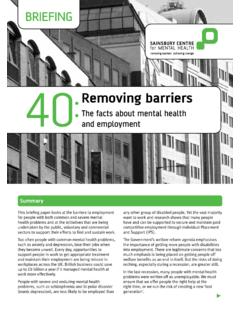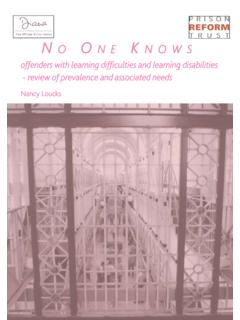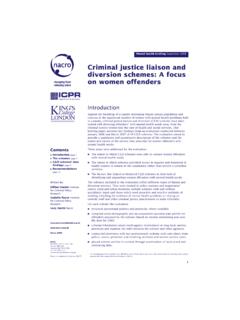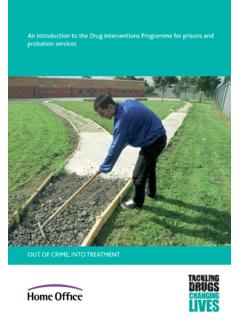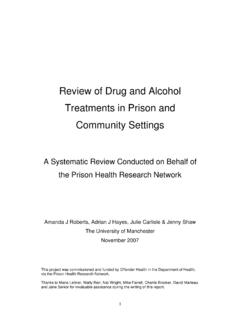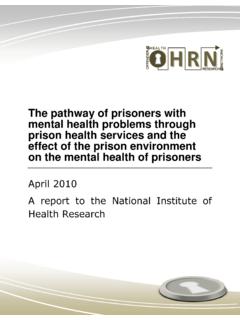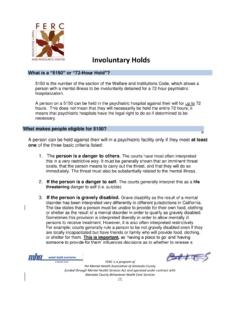Transcription of Good practice guidance: commissioning, administering …
1 good practice guidance : commissioning , administering and producing psychiatric reports for sentencingPrepared for: Her Majesty s Court ServicePrepared by: Rosie McLeod, Anna Sweeting, Lucy Joyce, Roger Evans and Claire Barkley, BMRB SocialPart of BMRB Limited (British Market Research Bureau) BMRB/RM/4510-8615 September 2010 Improving the structure and content of psychiatric reports for sentencingResearch to develop good practice guidanceRosie McLeod, Anna Sweeting, TNS-BMRB and Roger Evans, Liverpool John Moores UniversityThis information is also available on the Ministry of Justice website: views expressed are those of the authors and are not necessarily shared by the Ministry of Justice (nor do they represent Government policy). Crown Copyright from this document may be reproduced for non-commercial purposes on condition that the source is Published 2010 ISBN: 978-1-84099-402-5 Analytical Services exists to improve policy making, decision taking and practice by the Ministry of Justice.
2 It does this by providing robust, timely and relevant data and advice drawn from research and analysis undertaken by the department s analysts and by the wider research i1 commissioning Introduction Background to psychiatric reports for sentencing Determining whether a report is required Sentencing options using psychiatric reports for mentally disordered offenders Requesting a report 62 Court administration of reports Introduction Determination of appropriate psychiatrist Letters of instruction Administrative tasks to undertake prior to sending the letter of instruction Documents for inclusion with the letter of instruction 103 Producing reports Introduction Overview of criminal offences and the court system Background to sentencing options Administrative tasks
3 Writing a report Report content and template Appearing in court to give oral evidence 20 Further Reading 21 Appendix 1A Pro forma for request: magistrates court 22 Appendix 1B Pro forma for request: Crown Court 23 Appendix 2 Pro forma for letter of instruction 24 Appendix 3 Pro forma report template 26 Appendix 4 Criminal Procedure Rules, Part 33: Expert Evidence. Part : Content of expert s report 29 Appendix 5 Overview of sentencing options for mentally disordered offenders 31iLord Justice GoldringSenior Presiding Judge for England and WalesChris Mayer CBE Chief Executive, Her Majesty s Court ServiceForewordWe are very pleased to introduce this good practice guide, which we hope you will find helpful when dealing with requests for court psychiatric guide is designed to promote the wealth of identified good practice from magistrates, judiciary, court staff, psychiatrists and the health sector across England and Wales.
4 It aims to provide practical advice on the commissioning , administration and production of court psychiatric are grateful to the many people who have contributed towards the publication of this guide, particularly to members of the steering group and to those key stakeholders who provided valuable material at a series of focus groups held in autumn document provides good practice guidance for the commissioning , administration and production of psychiatric reports for sentencing in criminal courts. The guidance is designed to help psychiatrists, the judiciary and court staff. It is not intended to be prescriptive but to enable practitioners to reflect critically on their practice to ensure that it is of the highest quality. The guidance was produced following consultation about views on current and ideal best practice .
5 It forms part of a programme of work by Her Majesty s Courts Service aimed at improving provision for mentally disordered offenders within the Criminal Justice System. This programme includes the development of mental health liaison court services and service level agreements with National Health Service (NHS) Trusts for the provision of psychiatric reports. How to use the guidance :The guidance is divided into three main sections. Practitioners can refer directly to the section relevant to their own commissioning Ordering Administration for court staff in producing letters of Production for psychiatrists in the preparation of reports. These sections provide an outline of the process, and a description of tasks undertaken as best practice . In the appendices of the guidance , pro formas are provided which give a suggested structure to the documents which practitioners use in their roles.
6 These are designed to be applied directly in practice , or used as a reference point. They are intended to assist the smooth working of the courts, and to enable production of reports of the highest quality. 11 IntroductionReports may be commissioned by the magistrates courts and the Crown Court through Her Majesty s Courts Service when a defendant is considered possibly to have a mental disorder and an expert medical opinion is necessary to assist sentencing. The purpose of such a report is to provide professional evidence to inform the magistrate or judge on how to balance the need for mentally disordered offenders to receive specialist mental treatment with an appropriate disposal proportionate to the nature and severity of their offence(s). These procedures do not apply to family courts.
7 Background to psychiatric reports for sentencingThe court sentences: a psychiatrist can provide advice. A psychiatric report may help the sentencer to consider how effective different sentencing options may be in terms of the treatment of the mentally disordered offender, and the management of any risk to the public. Sentencers will look to the psychiatric report to inform them whether the defendant is mentally disordered for the purposes of the Mental Health Act assessmentsA central function of forensic psychiatry is assessing risk in general, and risk to other people, whereas, generally speaking, the emphasis of a general psychiatrist s work is in assessing risk to the individual. A psychiatrist can assess the mental health needs of an offender and advise on risk management which may assist the courts in sentencing.
8 For example, in relation to an indeterminate sentence with Imprisonment for Public Protection (IPP), a psychiatrist can advise the courts on risk factors associated with significant harm to the public, but ultimate sentencing discretion lies with the of risk assessmentsBased on a meeting with the offender, a psychiatric risk assessment tends to provide a short-term assessment of risk, and it is very difficult to predict further into the future. Past offences are considered to be the best predictor of future reoffending, so it is essential that the psychiatrist has access to the offender s criminal records. As a personal choice, certain psychiatrists use structured risk assessment tools when assessing the offender, but this will not affect the strength of their opinion, which remains subjective.
9 This is because risk assessment tools only have predictive power when applied 1 One caveat to the single definition of mental disorder is introduced by Section 1 (2A) of the 1983 Act. This provides that people who are learning-disabled are not mentally disordered for purposes of most provisions of the Act by reason of that disability alone unless it is associated with abnormally aggressive or seriously irresponsible groups, and not individuals. Although statistical information may describe and predict group activity, it cannot tell us which individual member of a group will do what, and so it cannot be used as a predictor for individual circumstances. TreatmentWhilst the primary emphasis of medical practitioners is on their duty of care to the patient, in writing a court report, this is not the only priority; the risk to the public and the duty to the court are also central to the assessment and medical recommendations made for the offender.
10 Forensic psychiatrists are trained with a more explicit duty to protect the public. By examining the patient s psychiatric history and assessing his/her current mental state, a psychiatrist can advise the courts whether the mental health of the person affected their behaviour with regard to the index offence. In cases of a severe mental disorder, it could be advised that hospital is more appropriate than imprisonment, or that treatment in the community should be a requirement of a community order. The psychiatrist must be explicit as to how treatment will make a difference, and what the exit service as well as the entry point into hospital would be. This is important for the court to understand the circumstances in which the offender would be discharged. Determining whether a report is required This is a matter for the judiciary to decide.
